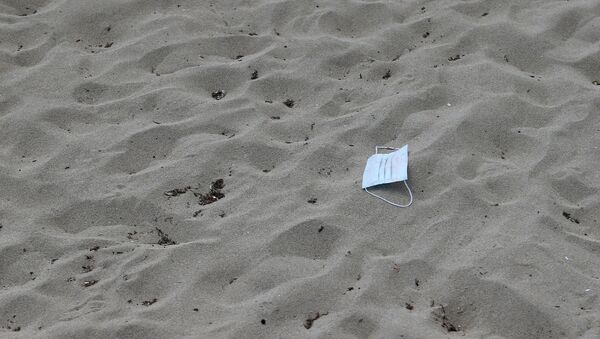New research suggests that the COVID-19 coronavirus can be transmitted from person to person even if wearing a face mask and while standing more than four feet away from each other.
In a study described by the authors as "alarming" and published in the journal Physics of Fluids on Tuesday, it has been suggested that face coverings alone do not block fluid droplets projected by a cough from entering the body. The research highlights the necessity of adhering to effective social distancing measures.
The same researchers previously discovered that droplets of saliva are capable of traveling 18 feet in just five seconds when an unmasked person coughs.
If a masked person repeatedly coughs, however, the effectiveness of a face covering can become depleted, the new study revealed, through the use of computer modeling software.
Study co-author and University of Nicosia professor, Dimitris Drikakis, said in a statement that facemasks do not provide complete protection. Social distancing, he noted, therefore "remains essential".
If a person has a coughing fit, "many droplets penetrate the mask shield, and some saliva droplet disease-carrier particles can travel more than 1.2 meters (4 feet)", Drikakis acknowledged.
"The droplet sizes change and fluctuate continuously during cough cycles as a result of several interactions with the mask and face," he explained.
The simulation used in the research revealed that the size of droplets can also be affected after colliding with the mask, causing some to escape and breach protection.
"Masks decrease the droplet accumulation during repeated cough cycles," Dr. Talib Dbouk, co-author of the study, added.
"However, it remains unclear whether large droplets or small ones are more infectious".
The researchers suggest that "much more complete personal protective equipment", including helmets with built-in air filters, face shields, disposable gowns, and two separate sets of gloves be given to frontline workers.
The new findings could be a cause for concern for those working in the health sector as they often cannot maintain proper social distancing measures.
Updated guidance from the World Health Organization (WHO) recommends that governments promote the widespread use of fabric face masks among the public.
Initially, WHO advice recommended that only those presenting symptoms or caring for an afflicted person wear masks. Since April, the Center for Disease Control and Prevention (CDC) has issued guidance asking everyone in public to wear a face covering.
As of Tuesday, the United States has at least 2.1 million confirmed cases of coronavirus and over 118,000 deaths from the disease.




